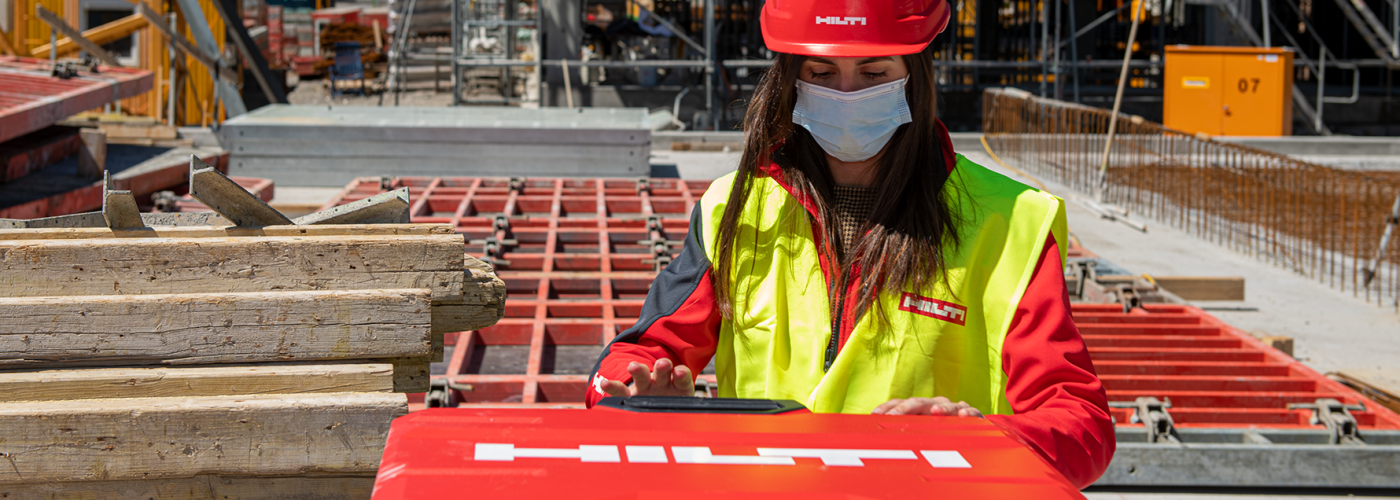As we approach the next step in the government’s roadmap out of lockdown, including the reopening of indoor entertainment venues from 17 May, it’s an opportunity for many to reflect on the changes life has thrown at us since the COVID-19 pandemic hit in March 2020. Whilst almost every industry was affected when lockdown pressed pause on daily life, the UK construction industry was ground to a complete halt for nearly 2 months when workers were ordered to stay at home.
Not only did 80% of construction businesses have to cancel or postpone projects (The Contractors Health and Safety Assessment Scheme, 2020), but when construction eventually resumed in the spring, supply chain disruptions caused further issues, with many goods and services becoming unavailable. Trade and travel restrictions continued throughout 2020, as did increased operating costs, decreased demand and mandatory legislation that required employees to social distance and wear PPE on site.
But with light finally at the end of the tunnel and reports showing a positive trajectory for the future of construction, attention turns to the aftermath and what is considered the new ‘normal’. Has the working landscape changed forever, and what positives can we take from these new ways of working? Employees from professional tool manufacturer Hilti share their thoughts.

Michaela Hunter, Training Officer
“When Covid hit, I had to work out how to deliver effective training to Hilti employees in a format that I never thought was possible. We were faced with the challenge of converting all of our material into a digital format, meaning we lost a key element of the training which was hands-on experience with the tools. It’s also more difficult to engage people digitally, so we had to get creative with activities and group work to encourage participation and help increase knowledge retention. We had a recruitment freeze in the UK too, so some of the team were redeployed to support other areas of the business, as there were less new employees to train.
“Adapting to this new way of working has been a struggle for me and made me appreciate the small things in life. It’s been really tough not having that social interaction in the office, where we could have a chat over a coffee. Not to mention the technical issues that come with working digitally. On the flip side, it’s shown how people have the resilience to adapt to dramatic changes. It’s created opportunities which we can utilise even when the pandemic is over, although I’m really looking forward to running sessions in person again.”

Charlie Ashworth, Implementation & Care Manager for Tool Services
“My team is national based so before the pandemic, I would usually spend 2-3 nights a week away from home. Over the past year, that hasn’t been possible and I haven’t been able to join my colleagues in their cars during field rides. I’ve had to adapt the way I coach and support the team – remote field rides via Teams has meant I’m in more regular contact with each team member.
“I’ve really enjoyed spending more time at home and hardly any nights in hotels, which has been great from a work-life balance perspective. Being able to join customer meetings via Teams has allowed me to be more productive too. But coaching and supporting is the best part of my role, so I’ve missed the human contact, as you don’t get the same experience with a Teams call compared to a full day in the field.
“I don’t think work will ever return to normal. Teams meetings will continue and there’ll definitely be less travelling in my role, but I still intend to get back out in the field once or twice a week.”
Emma Ross, Regional Head of Warehousing
“Working in Logistics during the pandemic has hugely challenged us as a team, as we simply can’t do our job remotely. The biggest impact it had for me personally was the greater focus of putting people first. I have always looked to do this, but the stress and pressure the team were under gave greater emphasis to keeping them safe – both physically and mentally. Those people working in warehousing across the country are the hidden key workers. Being unable to work from home and having to go in everyday takes its toll.
“We’ve really missed working alongside our office-based colleagues. Less formal communication is difficult to get right over Teams, so I’m certainly looking forward to meetings in person. We’re a very hands-on operation and like to physically show people the challenge, which isn’t as easy over a video call.
“On a positive note, the small team left on site have become much stronger and closer. The worry that you might make a loved one sick isn’t easy to face every day, so we’ve been able to support each other. But, the realisation that we’ve helped keep businesses moving, and even contributed to the construction of the Nightingale hospitals, has made it a very rewarding year.”
Chris Butters, Internal Sales Account Manager for Building Construction
“The past year has been a weird experience. I definitely never thought I’d do an interview sat in my kitchen wearing a pair of shorts. I’ve started in a new team too, so it’s been interesting meeting new team members and doing training via Teams rather than getting hands-on with the tools. I’ve also missed the banter of being in the office, and just seeing people in general.
“Despite the weirdness, I’ve loved being at home. I got to experience all of my son’s “firsts” like crawling, walking and talking – which is something I missed out on with my little girl. Luckily, I’m now back in the office twice a week, so it’s nice being able to see people and get support face to face.”
Has COVID-19 forced your business to adopt new ways of working? And has jobsite productivity fallen as a result? Get back on track with Hilti’s free productivity guide >
References:https://www.chas.co.uk/blog/covid-impact-on-construction-industry/






